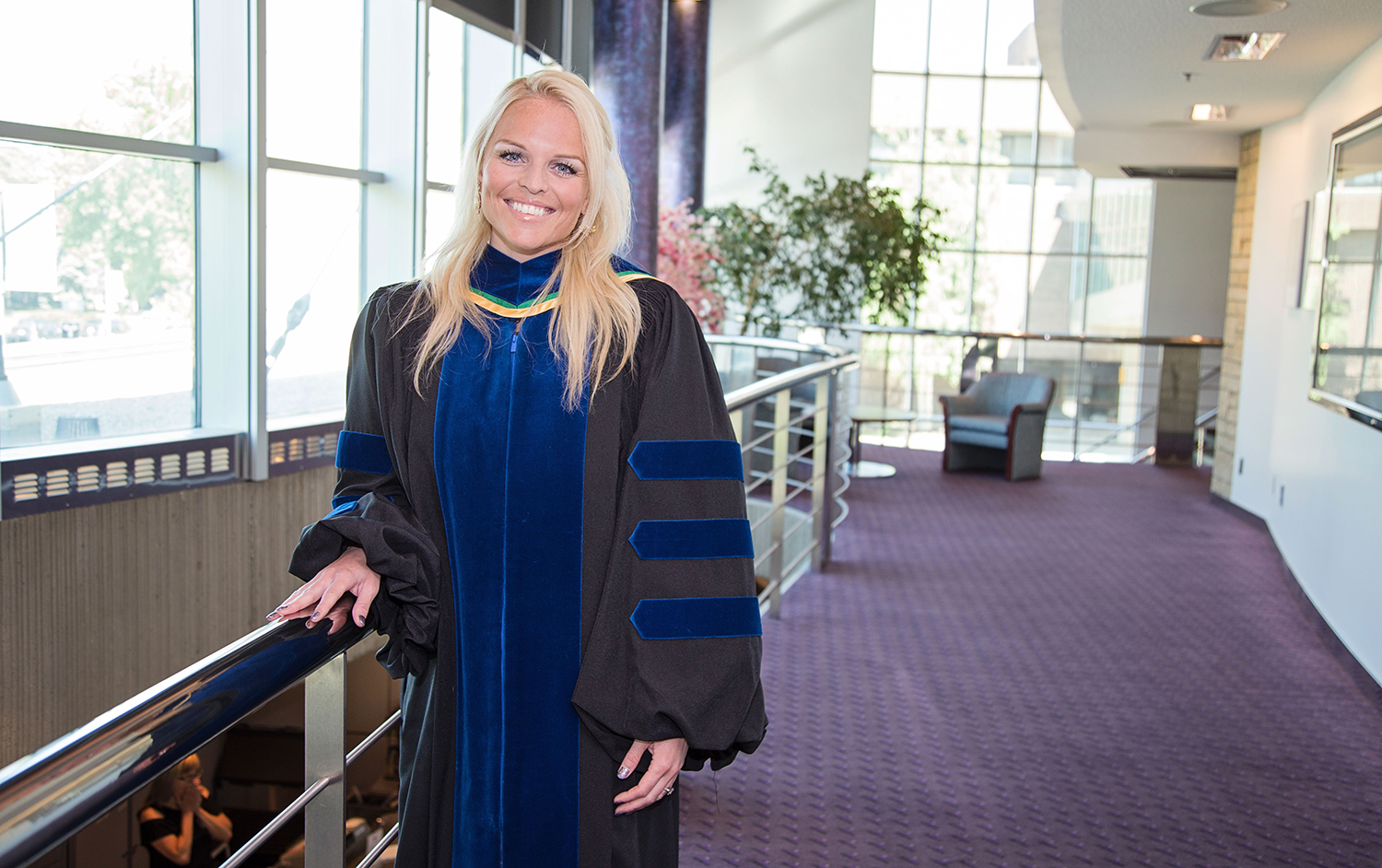
For her thesis Nicole Kain (PhD '17) explored the experiences of Canadian family physicians during public health crises.
When the H1N1 influenza pandemic hit Ontario in 2009, Nicole Kain played an important role for physicians.
While working as a nurse consultant on the vaccine preventable diseases team at the Ministry of Health and Long-Term Care, her team was faced with a public health crisis. Only four months on the job, Kain was called into a meeting about a new upper respiratory illness that was reported in patients in Mexico.
At the same time, there were concerns about an illness in pigs in California. Officials were not convinced there was a link. Within the next week the H1N1 influenza virus-or "Swine Flu," as the media initially called it-had emerged in Canada.
"When there is limited information about a novel virus, it can be scary for Canadians," explains Kain, one of the newest doctor of philosophy (PhD) in public health graduates from the School of Public Health. "Family physicians tend to be the most trusted source of information during a public health crisis, so we have to make sure we get the correct information to them in a timely fashion."
Kain helped synthesize information, alleviate concerns and debunk conflicting reports by developing regular Important Health Notices (IHNs) to be released by Ontario's chief medical officer of health. These IHNs were then sent to Ontario physicians and other members of the health care sector, advising them of the actions to take with their patients.

"I remember thinking how odd it was that someone with a nursing degree and fresh out of her master's was responsible for drafting such important communications pieces for physicians," explains Kain. "One would assume it would be an individual with more authority or knowledge. I didn't know their individual patient populations, and yet I was telling them what was best for their patients."
As the first wave of H1N1 influenza began to subside, Kain was left with questions.
"These days people become their own doctors through a simple Google search," explains Kain. "My experience with H1N1 made me want to explore how and who should effectively communicate information about public health crises. How can we best help people sift through the vast amounts of data, statistics, and news that they're inundated with every day? How do we accurately and appropriately communicate risk information during a public health crisis?"
Enter the School of Public Health at the University of Alberta.
After applying to various institutions, Kain ultimately chose the School because Dr. Cindy Jardine, former professor and alumna, was doing research on H1N1 and risk communication. This was enough for Kain to pack her bags, leave Toronto and move to Edmonton.
"I was warned that doing a PhD would be the hardest thing I would ever do," laughs Kain. "That was absolutely correct."
She admits that, for the first two years, there was a very real possibility that she would quit and move back to Ontario. But that all changed when Kain attended a workshop on phenomenology-the study of lived human experience.
"Prior to coming to the School, I didn't have a background in research," explains Kain. "Phenomenology was appealing to me because it is qualitative, and steeped in philosophy. Phenomenological research and writing is similar to storytelling, and this method truly gets to the heart of an individual experience and helps to illuminate it. Discovering phenomenology changed the trajectory of my thesis."
With a renewed purpose, Kain explored the experiences of Canadian family physicians during public health crises. She interviewed 16 family physicians from across Canada to determine what their personal experience was like when faced with a crisis like SARS, Ebola, H1N1, or even natural disasters.
She found there had been a variety of quantitative research done regarding family physicians' experiences in public health crises, but there had been limited qualitative research exploring this particular area.
"My research demonstrates what living through that particular experience was like," says Kain. "It allows readers to walk in the physicians' shoes, and to actually experience what it might be like to live through a public health crisis as a family physician."
In addition to illuminating what it might be like for family physicians to experience a public health crisis, Kain also synthesized various recommendations from participants in the event of a future public health crisis. For example, during the Ebola scare some participants said they didn't know how to put on an N95 mask, or what the process would be should a suspected Ebola patient come into their office. Based on these anecdotes, Kain's research helps to provide considerations for public health agencies and professional organizations to improve risk communication to family physicians in times of crises.
"As we prepare for public health crises, it's important we consider the evolving role of the family physician, and how public health agencies and other professional organizations can communicate to this important group," explains Kain. "Because of the trust their patients have in them, these individuals play a very important role in public health crisis response."
Nicole Kain is the PhD recipient of the Dean's Gold Medal. The Dean's Gold Medal was created as a legacy initiative during the School's 10th anniversary celebrations. The award recognizes superior academic performance.